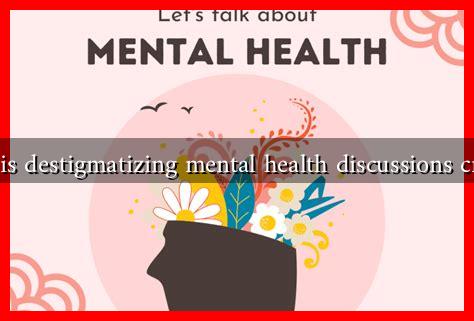-
Table of Contents
Why is Destigmatizing Mental Health Discussions Crucial?
Mental health has become a focal point of discussion in recent years, yet stigma surrounding it remains pervasive. Destigmatizing mental health discussions is not just a matter of social justice; it is essential for improving individual well-being and public health. This article explores the importance of destigmatizing mental health, the consequences of stigma, and actionable steps to foster open conversations.
The Impact of Stigma on Mental Health
Stigma surrounding mental health can lead to significant barriers for individuals seeking help. According to the National Alliance on Mental Illness (NAMI), approximately 1 in 5 adults in the U.S. experience mental illness each year. However, many do not seek treatment due to fear of judgment or discrimination. The consequences of this stigma can be severe:
- Delayed Treatment: Individuals may avoid seeking help, leading to worsening symptoms and more complex health issues.
- Social Isolation: Stigmatized individuals often withdraw from social interactions, exacerbating feelings of loneliness and depression.
- Employment Challenges: Fear of disclosure can prevent individuals from pursuing job opportunities or promotions.
- Increased Risk of Suicide: Stigma can contribute to feelings of hopelessness, increasing the risk of self-harm and suicide.
Real-World Examples of Stigma’s Consequences
Numerous case studies illustrate the detrimental effects of stigma on mental health. For instance, a study published in the journal Psychological Medicine found that individuals with mental health conditions were less likely to be hired compared to those without such conditions, even when qualifications were identical. This discrimination not only affects the individual but also has broader implications for workplace diversity and productivity.
Another poignant example is the story of Kevin Hines, a mental health advocate who survived a suicide attempt after struggling with bipolar disorder. Hines emphasizes that stigma kept him from seeking help for years, leading to a near-fatal decision. His journey highlights the urgent need for open discussions about mental health to prevent similar tragedies.
The Benefits of Destigmatizing Mental Health Discussions
Destigmatizing mental health discussions can lead to numerous benefits for individuals and society as a whole:
- Increased Awareness: Open conversations can educate the public about mental health, reducing misconceptions and fostering empathy.
- Encouragement to Seek Help: When mental health is normalized, individuals are more likely to seek treatment without fear of judgment.
- Improved Workplace Culture: Organizations that promote mental health awareness can create supportive environments, enhancing employee well-being and productivity.
- Community Support: Destigmatization fosters a sense of community, encouraging individuals to share their experiences and support one another.
Steps to Foster Open Conversations
To effectively destigmatize mental health discussions, several actionable steps can be taken:
- Education and Training: Schools and workplaces should implement training programs that educate individuals about mental health issues and the importance of empathy.
- Media Representation: Encourage responsible media portrayals of mental health to challenge stereotypes and promote understanding.
- Support Groups: Create safe spaces for individuals to share their experiences, fostering community and reducing isolation.
- Advocacy: Support policies that promote mental health awareness and protect the rights of individuals with mental health conditions.
Conclusion
Destigmatizing mental health discussions is crucial for fostering a society where individuals feel safe to seek help and share their experiences. The consequences of stigma are far-reaching, affecting not only those with mental health conditions but also families, workplaces, and communities. By promoting open conversations, we can create a more supportive environment that encourages individuals to prioritize their mental well-being. As we move forward, let us commit to breaking down the barriers of stigma and building a culture of understanding and compassion.
For more information on mental health resources and advocacy, visit NAMI.

